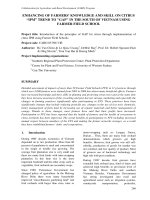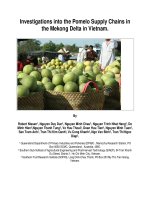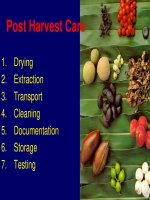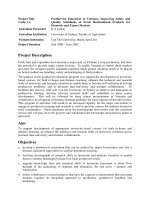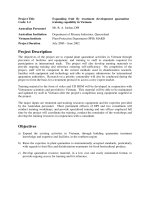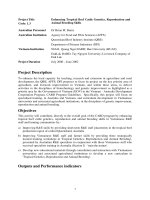Báo cáo nghiên cứu nông nghiệp " Field control of pest fruit flies in Vietnam " pptx
Bạn đang xem bản rút gọn của tài liệu. Xem và tải ngay bản đầy đủ của tài liệu tại đây (89.21 KB, 14 trang )
Project Title
Code: 2.1
Field control of pest fruit flies in Vietnam
Australian Personel
Professor R.A.I. Drew, Professor R.L. Kitching
Australian Institution
Australian School of Environmental Studies, Griffith
University
Vietnam Institution
NIPP, SOFRI, CCPP
Project Duration
July 2001 to June 2003
Project Description
The project is designed to complement an ACIAR project on Fruit Flies in Vietnam.
Whereas the ACIAR project will investigate the pest fruit fly species, the crops they
attack and levels of damage inflicted, this proposed project under CARD is designed to
equip laboratories and staff at three centres under MARD, provide an experimental
foundation for production of protein for fruit fly control and animal food and instruct
farmers in fruit fly pest management.
The project will build on existing collaboration that has been established by Professor R.
Drew (Griffith University) while acting as a consultant to a 1-year FAO-TCP project that
was set up to obtain information on the fruit fly problem in Vietnam. This collaboration
has brought together staff from Griffith University, the National Institute of Plant
Protection (NIPP) and the Southern Fruits Research Institute (SOFRI).
Objectives
The objectives of this proposed project are designed to interlock with, and support the
components of, the ACIAR and Crawford Fund project activities. Specifically, under this
CARD proposal, the objectives are as follows –
(a) Conduct a project coordination meeting in Hanoi to plan the project activities with
officers from NIPP, CCPP, SOFRI, ACIAR, AusAID, Foster’s Brewery and
Aventis
(b) Equip laboratories at NIPP, CCPP and SOFRI to carry out studies on fruit fly
species attraction to protein, training of trainers and farmer training exercises
(c) Supervise quality control of protein manufacture at Foster’s Brewery, My Tho,
through the use of laboratory and field fruit fly attractancy tests
(d) Conduct one training program for trainers. This will involve staff from Griffith
University training staff from NIPP, CCPP, SOFRI and some PPPD staff in
central Provinces around Quang Ngai, in a 10 day workshop in Hanoi
(e) Conduct three farmer field schools, one in each of three provinces i.e., Moc Chau,
Quang Ngai and Tien Giang. Each school will require 1 day per month for 6
months, during the fruiting season of the main fruit crops. The schools will be
conducted by the trainers trained in (d) above. These farmer field schools will be
conducted in each year of the project and will provide experience for extending
the training in fruit fly pest management and IPM to farmers across Vietnam in
future years. In particular, the schools in year 2 will be used to obtain feedback
information from farmers on the acceptance and efficacy of the new fruit fly
control strategies.
Outputs and Performance indicators
Outputs Performance Indicators
(a) Conduct project
coordination meeting in
Hanoi
(a) Coordination of work programs to be carried out under
ACIAR, Crawford Fund and CARD projects.
Performance Indicator: A report documenting the integrated
work programs on 3-monthly cycles, including listing of
personnel responsible for all duties.
(b) Equip laboratories at
NIPP, CCPP and SOFRI
for work programs to be
carried out
(b) Equipment, general supplies and staff delivered to each
laboratory for the future project work.
Performance Indicators: New staff appointed, equipment and
supplies in place
(c) Laboratory and field
protein attractancy
experiments for
maintenance of protein
manufacture quality
control
(c) Laboratory cage and field ground sheet attractancy tests
completed. These tests will use fruit flies cultured under the
ACIAR project and measure the responses of the flies to the new
protein produced at Foster’s Brewery, My Tho.
Performance Indicators: 6-monthly reports presenting results of
attractancy tests
(d) Training program for
trainers i.e. for staff from
NIPP, CCPP, SOFRI and
Central Province PPPD
(d) Professor Drew and GU staff to travel to Hanoi and conduct
a training workshop to equip trainers for Farmer Field Schools.
This will be a 10-day program and include teaching sessions,
field exercises and planning of extension literature for farmer
training.
Performance Indicators: Trained staff at the project centres; lists
of equipment needed and extension literature planned for Farmer
Field Schools; Farmer Field Schools organised; Extension
literature printed.
(e) Farmer Field Schools
conducted, one in each of
three provinces i.e. Moc
Chau, Quang Ngai and
Tien Giang
(e) Farmer Field Schools completed over a 6-month period in
each year of the project, one in each of Moc Chau, Quang Ngai
and Tien Giang. Schools to be conducted by trainers trained in
(d) above.
Performance Indicators: Extension literature provided to farmers
and farmers in each province, where training was conducted,
applying protein bait for fruit fly control.
PROJECT COMPLETION REPORT
Executive Summary
To combat the problems of stagnant incomes for staple food (rice) growers rural, poverty
and household food security, Vietnam has embarked on a major program to rehabilitate
the horticultural and expand the area under cultivation of improved varieties of fruits and
vegetables. Based on extensive experience in Australia and from other countries in South
East Asia in horticulture pest management, damage by fruit flies is the main obstacle to
the successful establishment of horticultural industries in Vietnam. To address this
problem, the Ministry of Agriculture and Rural Development in Vietnam (MARD), in
collaboration with from Griffith University, conducted a two-year AusAID-CARD
project entitled “Field control of pest fruit flies in Vietnam” from June 2001 – July 2003.
This CARD project was designed to complement ACIAR and Crawford Fund projects on
“Managing pest fruit flies to increase production of fruit and vegetable crops in
Vietnam.” Whereas the ACIAR project will investigate the pest fruit fly species, the
crops they attack and levels of damage inflicted, and the Crawford Fund financed the
construction of a plant at Foster’s Brewery in Tien Giang province in Vietnam to convert
waste brewery yeast into protein for fruit fly control and animal food, the objectives of
the CARD project were to equip laboratories and staff at partner institutions under
MARD, to provide an experimental foundation for production of protein from beer waste,
and to train Vietnamese staff and farmers in fruit fly pest management.
The CARD project has fully achieved all its objectives. The laboratories at the National
Institute of Plant Protection (NIPP) and the Southern Fruits Research Institute (SOFRI)
have been provided with the full set of equipment to conduct host fruit surveys and trap
collections of fruit flies across Vietnam, as well as equipment for rearing major pest
species in the laboratory. The required staff have also been permanently appointed to the
project. The protein production plant at Foster’s Brewery in Tien Giang province has
been commissioned and protein being produced at this plant is being evaluated as a bait
for fruit fly control in Vietnam. The training program for trainers and farmers exceeded
initial targets. The first training program was conducted in June 2002 by Griffith
University project staff for 27 Vietnamese participants from six different national
agencies. These core trainers then conducted a second round of training for 176 Plant
Protection and Sub-department staff. Finally, a series of one-day training courses was
conducted from September 2002 to March 2003, for batches of 25 farmers each from 16
provinces across Vietnam. This has resulted in over 1600 farmers receiving training in
fruit fly identification, biology and pest management across Vietnam so far. This
exercise was accompanied by the distribution of over 3000 illustrated brochures in the
Vietnamese language on the biology and field pest management of pest fruit flies,
incorporating the new bait spray technology.
The primary beneficiaries of the AusAID-CARD project are NIPP, SOFRI, PPPD staff
and through these institutions, Vietnamese farmers in several provinces, all of whom
have been be trained in fruit fly identification and field management techniques, in
particular the environmentally friendly spot spray method of controlling fruit flies using
the protein bait produced from local beer yeast waste. Farmers and their workers, many
of whom are women and children will also benefit from reduced application of toxic
pesticides and consumers in Vietnam will benefit from pesticide-free fruits. Because 85%
of the population of Vietnam resides in rural communities and depends on agriculture for
survival, this project will make a direct contribution to the majority of the nation’s
people. Through increased availability of food and larger quantities of better quality fruits
and vegetables for marketing, the project will make significant socio-economic
contributions across the community and gender sectors.
1. Project Description
1.1 Background and preparation
To combat the problems of stagnant incomes for staple food (rice) growers (World Bank
1997), rural poverty and household food security, Vietnam has embarked on a plan of
crop diversification and expanded plantings of a range of agricultural crops. Specifically,
government agricultural production targets were set at 10 million tonnes of fruits and
vegetables in the year 2000, up from an average of 4 million tonnes/year in the years
1993-1995. The government has also embarked on major rehabilitation and expansion of
the horticultural sector with the assistance of the Asian Development Bank to introduce
new high yielding varieties of tropical and subtropical fruits in south and north Vietnam
respectively.
Based on extensive experience in Australia and from other countries in South East Asia
in horticulture pest management, damage by fruit flies is bound to rapidly emerge as the
major obstacle to the successful establishment of horticultural industries in Vietnam.
Thus Vietnam will need, and benefit significantly from, an Integrated Pest Management
approach, based first and foremost on successful control of fruit flies using spot sprays of
protein baits. Realising this problem, the Food and Agriculture Organisation (FAO)
appointed Professor R. Drew on a one-year consultancy from March 1999 to April 2000
to assess the fruit fly problem in Vietnam. The Griffith University (GU) Fruit Fly
Research Group led by Professor R.A.I. Drew, worked on the FAO-TCP funded fruit fly
project in Vietnam from March 1999 to April 2000. This 1-year project has given GU
specific, strong linkages with the Vietnamese Ministry of Agriculture and Rural
Development (MARD) and two of its key institutions, the National Institute of Plant
Protection (NIPP) in Hanoi, and the Southern Fruits Research Institute (SOFRI) in My
Tho province, south Vietnam, as well as with staff at State Farms and Provincial Plant
Protection Departments (PPPD). The PPPD serves as the key extension agency in
Vietnam and operates through an extensive network of extension staff that regularly visit
and assist Vietnamese farmers.
Following on from this initial effort, Griffith University then began a four-year project
supported by ACIAR entitled “Managing pest fruit flies to increase production of fruit
and vegetable crops in Vietnam.” This project will run from June 2001 – July 2005. In
conjunction with this ACIAR project, a two-year AusAID-CARD project was also
conducted from June 2001 – July 2003. The construction of a plant at Foster’s Brewery in
the province of Tien Giang (south Vietnam) to convert waste brewery yeast into protein
bait was financed by the Crawford Fund and its industry partner AVENTIS.
The primary beneficiaries of the AusAID-CARD project are NIPP, SOFRI, PPPD staff
and through these institutions, Vietnamese farmers in several provinces, all of whom
have been be trained in fruit fly identification and field management techniques, in
particular the environmentally friendly spot spray method of controlling fruit flies using
the protein bait produced from local beer yeast waste. Farmers and their workers, many
of whom are women and children will also benefit from reduced application of toxic
pesticides and consumers in Vietnam will benefit from pesticide-free fruits. Because 85%
of the population of Vietnam resides in rural communities and depends on agriculture for
survival, this project will make a direct contribution to the majority of the nation’s
people. Through increased availability of food and larger quantities of better quality fruits
and vegetables for marketing, the project will make significant socio-economic
contributions across the community and gender sectors.
1.2 Context and rationale
The CARD project was designed to complement an ACIAR project entitled “Managing
pest fruit flies to increase production of fruit and vegetable crops in Vietnam.” Whereas
the ACIAR project will investigate the pest fruit fly species, the crops they attack and
levels of damage inflicted, the project under CARD is designed to equip laboratories and
staff at three centres under MARD, provide an experimental foundation for conversion of
brewery yeast waste production of protein for fruit fly control and animal food, and
instruct Vietnamese farmers in fruit fly pest management.
The project built on existing collaboration that had been established by Professor R.
Drew (Griffith University) while acting as a consultant to a 1-year FAO-TCP project that
was set up to obtain information on the fruit fly problem in Vietnam.
1.3 Project objectives and scope at design
The CARD project was designed to interlock with, and support the components of, the
ACIAR and Crawford Fund project activities. Specifically, under this CARD project, the
objectives are as follows:
a) Conduct a project coordination meeting in Hanoi to plan the project activities with
officers from NIPP, SOFRI, CCPP, ACIAR, AusAID, Foster’s Brewery and Aventis.
b) Equip laboratories at NIPP, SOFRI and CCPP to carry out studies on fruit fly species,
attraction to protein, training of trainers, and farmer training exercises.
c) Supervise quality control of protein manufacture at Foster’s Brewery, My Tho, through
the use of laboratory and field fruit fly attractancy tests.
d) Conduct one training program for trainers. This will involve staff from Griffith
University training staff from NIPP, SOFRI, CCPP and some PPPD staff in central
provinces around Quang Ngai, in a 10-day workshop in Hanoi.
e) Conduct three farmer field schools, one each in each of three provinces. Each school
will require 1 day per month fpr 6 months, during the fruiting season of the main fruit
crops. The schools will be conducted by the trainers trained in (d) above.
1.4 Implementation arrangements
Griffith University as the project leader will manage and conduct the project in
collaboration with the Ministry of Agriculture and Rural Development in Vietnam, which
is represented by the National Plant Protection Centre (NIPP) in Hanoi and The Southern
Fruits Research Institute (SOFRI) in My Tho. Vietnam is geographically spread over a
wide latitude, and was thus divided into a northern and southern zone for ease of
implementation of the project. NIPP handled all aspects of the project north of the city of
Danang in central Vietnam, while SOFRI was in charge of the project south of Danang
and into the Mekong delta.
2. Appropriateness of Project Design and Objectives
2.1 Appropriateness of Objectives
Objective Objective Description Appropriatenes
s Rating
(a) Project Coordination
Meeting
To conduct a planning workshop in
Vietnam to coordinate the activities to be
performed by all project participants
5
(b) Equip
laboratories in
Vietnam
To ensure that the laboratories at NIPP and
SOFRI have the necessary equipment and
supplies to conduct the project
5
(c) Attractancy tests for
maintenance of protein
manufacture quality
control
To test the attractancy of fruit flies to new
protein formulations produced at the
Fosters Brewery, My Tho, under the
Crawford Fund support
5
(d) Training program for
trainers
Training of Vietnam staff in fruit fly
identification, biology and field pest
management, including the new bait spray
technology.
5
(e) Farmer field
schools
To train farmers in three provinces in fruit
fly pest management
5
5- Best Practice; 4- Fully Satisfactory; 3- Satisfactory overall; 2- Marginally Satisfactory;
1- Weak
2.2 Appropriateness of Design
Outline the key features of the selected project design and discuss the appropriateness of
these, provide a rating of the appropriateness of each design feature using the scale listed
below.
Description of design feature Appropriateness
Rating
(a) Construction of a processing plant to convert waste brewery
yeast into protein bait for fruit fly control and/or animal feed
suplement at Foster’s Brewery in Tien Giang province.
Sucessfully completed and now able to supply protein to
formers.
5
(b) Training of trainers - Completion of training conducted
from 3-7 June 2002 for a core group of 27 trainers from 6
national agencies in Vietnam. These trainers then conducted
further training of other staff and farmers across the country.
5
(c) Farmer field schools – a total of 176 PPPD staff and 1600
farmers from 16 provinces across Vietnam have been trained by
the core group of Vietnamese trainers.
5
(d) Farmer leaflet – over 3000 illustrated brochures in the
Vietnamese language explaining fruit fly biology and
management, incorporating the new protein bait spsray
techology have been printed and distributed to farmers.
5
5- Best Practice; 4- Fully Satisfactory; 3- Satisfactory overall; 2- Marginally Satisfactory;
1- Weak
3. Implementation Performance
3.1 Project Components and Outputs
Provide details on project components including outputs and performance indicators.
Provide a rating of performance against each component using the scale given below.
Comp
-onent
No.
Component
Description
Outputs Performanc
e Indicators
Perfor-
mance
Rating
1. Research
Coordinatio
n Workshop
Coordination of work programs carried out
under ACIAR, Crawford Fund and CARD
projects. This workshop brought together
staff from six participating organisations in
Vietnam (SOFRI, NIPP, Aventis, Foster’s
Brewery, AusAID and ACIAR) and
developed a detailed work program for
implementation.
Completed
and report
submitted
in 2001
4
2. Equip The laboratories at NIPP and SOFRI were Completed 4
laboratories
at NIPP and
SOFRI in
Vietnam
provided with the full set of equipment to
conduct host fruit surveys and trap
collections of fruit flies across Vietnam, as
well as equipment for rearing major pest
species in the laboratory. Staff were also
permanently appointed to the project.
and report
submitted
in 2001
3 Quality
control of
protein
manufacture
The plant at Foster’s Tien Giang Brewery to
convert brewery yeast waste into a protein
bait has been fully commissioned. The
protein bait produced by this plant has been
tested both in the laboratory and the field
and found to be highly attractive to pest fruit
flies in Vietnam. Large-scale field control
trails on a number of important fruit crops
are in progress.
Completed
and report
submitted
in 2002
4
4 Training of
trainers
The first training program was conducted
from 3-7 June 2002 by Griffith University
project staff for 27 senior Vietnamese
participants from SOFRI, NIPP, Quarantine
and Plant Protection Departments, three
Universities and Bayer Crop Sciences –
Vietnam. These core trainers then conducted
a second round of training for 90 Sub-Plant
Protection Department staff in south
Vietnam and another 86 Sub-PPD and Sub-
Plant Quarantine Department staff in north
Vietnam from August to December 2002.
Completed
and report
submitted
in 2002
5
5 Farmer field
schools
The program for training farmers was
modified. The initial plan was to conduct
farmer field schools for 60 farmers from 3
provinces. However, Vietnamese project
partners felt that it was important for the
new bait spray technology to be introduced
to farmers across Vietnam instead of a small
group. It was also felt that another vital need
at this stage of the project was to create
nationwide awareness amongst farmers
regarding the fruit fly problem, and to lay
the groundwork for farmer field schools,
which ideally need to be conducted over a
period of 6-12 months to ensure adoption
and integration of the new bait spray
technology. Thus a series of one-day
training courses was conducted from
September 2002 to March 2003, for batches
5
of 25 farmers each from 16 provinces across
Vietnam. This has resulted in over 1600
farmers receiving training in fruit fly
identification, biology and pest management
across Vietnam so far. This exercise was
accompanied by the distribution of over
3000 illustrated brochures in the Vietnamese
language on the biology and field pest
management of pest fruit flies, incorporating
the new bait spray technology.
5: Exceeding time and quality targets, 4: Achieving time and quality targets and on
budget; 3: Moderate progress towards targets, some issues about quality, budgets or costs
but these are being adequately addressed; 2: Some progress towards targets, but slippage
in schedule and cost overruns; & 1: Significant problems in achieving targets, quality
outputs unlikely to be achieved and substantial cost increases affecting overall budget.
3.2 Project Outcomes
The key outcomes of the CARD project are:
1. Coordination of the activities and inputs of the various participating agences has been
excellent and has lead to the achievement of all planned outcomes on time and within the
budget provided.
2. All equipment, supplies and project funds were transferred to NIPP and SOFRI on
time, and has enabled these participating agencies to meet with project milestones and
targets.
3. Construction of the protein manufacturing plant at Foster’s Brewery at Tien Giang was
delayed in the first year of the CARD project because of design and purchasing problems.
However, this problem was resolved in the second year of the project and the plant has
now been completed and is fully commissioned. Attractancy tests on the protein
produced have also been successfully completed. The initial delay in construction of the
protein production plant has not affected the progress of the CARD project.
4. The initial plan under the CARD project was to conduct farmer field schools for only
60 farmers from 3 provinces in Vietnam. In consultation with Vietnamese project
workers, this training program was modified to benefit a much larger number of farmers
because Vietnamese project partners felt that it was important for the new bait spray
technology to be introduced to farmers across Vietnam instead of a small group. It was
also felt that another vital need at this stage of the project was to create nationwide
awareness amongst farmers regarding the fruit fly problem, and to lay the groundwork for
farmer field schools, which ideally need to be conducted over a period of 6-12 months to
ensure adoption and integration of the new bait spray technology. Thus a series of one-
day training courses was conducted from September 2002 to March 2003, for batches of
25 farmers each from 16 provinces across Vietnam. This has resulted in over 1600
farmers receiving training in fruit fly identification, biology and pest management across
Vietnam so far. This exercise was accompanied by the distribution of over 3000
illustrated brochures in the Vietnamese language on the biology and field pest
management of pest fruit flies, incorporating the new bait spray technology.
3.3 Sectoral Impact
Many farms in rural Vietnam rely on family labour, which often is made up of women
and children. As is often seen under the hot humid climates of developing tropical
countries, the prescribed safety guidelines and precautions regarding pesticide use are
difficult to observe or implement. Thus women and children are likely to be excessively
exposed to pesticides traditionally used as cover sprays to control a range of insect pests
including fruit flies.
A major contribution of the CARD/ACIAR project in Vietnam (and elsewhere) has been
the introduction of the spot spray protein bait technology that does not expose farm
labour to toxic pesticides. The new protein bait spot spray technology taught to farmers
through the CARD project utilizes a low volume of spray (20 ml per tree) and a minute
amount of a relatively safe (very low toxicity) pesticide . Farm workers (women and
children) thus benefit by not being exposed to dangerous levels of pesticides.
In north Vietnam in the province of Son La the Vietnamese government has embarked on
a major program to introduce the cultivation of peaches to the minority hill tribes in this
area as an alternative to the cultivation of poppy. Damage by fruit flies, however, causes
extensive losses to yield. Staff at NIPP are currently conducting trials on the application
of spot sprays of the new protein bait to control fruit flies infesting peach in this province.
The minority hill tribes are expected to gain significantly from this CARD/ACIAR
initiative.
3.4 Costs and Financing
The protein production plant at Foster’s Tien Giang Brewery was constructed and
commissioned at a realtively low cost of about 120,000 dollars. This was achieved
through having a large part of the equipment fabricated in Vietnam using local materials
and expertise.
The training program was extended to over 1600 farmers instead of the 60 as originally
planned. This was achieved primarily through the inputs and efforts of NIPP, SOFRI and
PPPD using their own resources and without needing additonal funding than what was
originally budgeted for.
All other components of the CARD project have met with expenditures as planned. A full
acquittal is provided in Appendix 1.
3.5 Monitoring of project
Monitoring of the project was conducted through regular 6 monthly visits by project staff
from the lead agency Griffith University to NIPP and SOFRI. Detalied project
discussions were conducted with project staff along with visits to field sites and planning
for future work. The project leaders at both NIPP and SOFRI communicated regularly by
E-mail and submitted performance reports and data for AusAID and ACIAR reports as
required. Project staff at Griffith University also communicated with project staff in
Vietnam Project leaders in Vietnam by telephone. These telephone communications in
between the visits enabled problems to be rapidly sorted out and the necessary
adjustmenmts to be made toi ensure smooth running of the project.
3.6 Technical Assistance, Training and Capacity Building
Training and capacity building in Vietnam has been a key component of the CARD
project. The first training workshop for trainers conducted from 3-7 June 2002 by Griffith
University project staff for 27 senior Vietnamese participants from SOFRI, NIPP,
Quarantine and Plant Protection Departments, three Universities and Bayer Crop
Sciences in Vietnam, has greatly strengthened the capacity of Vietnamese to further
conduct their own training in Vietnam. These core trainers have then proceeded and
successfully completed a second round of training for 90 Sub-Plant Protection
Department staff in south Vietnam and another 86 Sub-PPD and Sub-Plant Quarantine
Department staff in north Vietnam over the period August to December 2002.
Both NIPP and SOFRI with technical assistance from Griffith University project staff,
have produced an illustrated one-page leaflet on fruit fly identification, biology and pest
management for Vietnamese farmers. Training has now been extended to over 1600
farmers from 16 provinces across Vietnam. The ability to train such a large number of
farmers, has been largely due to the Vietnamese partner institutions working very well
with regional plant protection departments to carry out the training for farmers.
This round of training carried out under the CARD project has provided Vietnamese
plant protection and quarantine department staff as well as farmers, for the first time, with
the ability to identify fruit flies of economic importance in Vietnam, a good
understanding of the economic losses they cause, and a sound knowledge of the various
control strategies and methods, with particular emphasis on the new protein spot spray
technology. This “short-term” training should be supported by a long–term training
program that will ensure successful adoption and sustainability of the new technology
being introduced to farmers. It is proposed that such long-term training be conducted
under a farmer field school training program which is carried out over a 6 – 12 month
period in selected locations in Vietnam.
3.7 Management of Constraints, Issues, Risks and Change
No major difficulties have been encountered during the project except for an initail delay
during the firsat year of the project in the construction of the protein manufacturing plant
at Foster’s Brewery at Tien Giang. The delay was caused by the longer tha expected time
to purchase materials and have the equipment fabricated locally in Vietnam. However,
the plant was completed and commissioned in the second year of the project and the
project has proceeded on schedule.
3.8 Project Management
Project
Component
Performance of lead institution (Griffith
University)
Performance and
input rating of
Vietnamese partner
institutions
Research
Coordinatio
n Workshop
Provided leadership and overall coordination of
work programs carried out under ACIAR,
Crawford Fund and CARD projects to successfully
bring together staff from six participating
4
organisations in Vietnam (SOFRI, NIPP, Aventis,
Foster’s Brewery, AusAID and ACIAR) to
develop a detailed work program for
implementation.
Equip
laboratories
at NIPP and
SOFRI in
Vietnam
Equipped the laboratories at NIPP and SOFRI with
the full set of equipment to conduct host fruit
surveys and trap collections of fruit flies across
Vietnam, as well as equipment for rearing major
pest species in the laboratory. Staff were also
permanently appointed to the project.
4
Quality
control of
protein
manufacture
The plant at Foster’s Tien Giang Brewery to
convert brewery yeast waste into a protein bait has
been fully commissioned. The protein bait
produced by this plant has been tested both in the
laboratory and the field and found to be highly
attractive to pest fruit flies in Vietnam. Large-scale
field control trails on a number of important fruit
crops are in progress.
4
Training of
trainers
Completed the first training program for 27 senior
Vietnamese participants from SOFRI, NIPP,
Quarantine and Plant Protection Departments,
three Universities and Bayer Crop Sciences –
Vietnam. These core trainers then conducted a
second round of training for 90 Sub-Plant
Protection Department staff in south Vietnam and
another 86 Sub-PPD and Sub-Plant Quarantine
Department staff in north Vietnam from August to
December 2002.
5
Farmer field
schools
Based on the knowledge and technology
transferred by Griffith university project staff to
the Vietnamese partner institutions, over 1600
farmers have received training in fruit fly
identification, biology and pest management
carried out by Vietnamese project staff. Over 3000
illustrated brochures in the Vietnamese language
on the biology and field pest management of pest
fruit flies, incorporating the new bait spray
technology have been printed and distributed.
5
5: Best Practice; 4: Fully Satisfactory; 3: Satisfactory Overall; 2: Marginally Satisfactory;
1: Weak.
4. Performance and Outcomes
4.1 Assessment of Performance Against Objectives and Design
Overall, the project has proceeded smoothly and all the expected outcomes have been
achieved on time and on budget. The construction of the protein production plant was
delayed in the first year of the project because purchase of materials and fabrication of
the plant using local materials and labour took longer than expected. However, the plant
was completed and successfully commissioned in the second year of the project. While
the protein plant was being constructed in 2002, samples of brewery waste were
processed in small batches in the laboratory at SOFRI for evaluation of attractancy to
adult fruit flies in Vietnam. Thus the initial delay in the construction of the protein plant
did not affect the quality control and field attractancy testing component of the project.
With the commissioning of the protein plant in March 2003, large quanitiies of protein
bait are now available for further evaluation and distribution to farmers.
The training program for farmers was initially planned for 60 farmers in 3 provinces.
However, based on recommendations from Vietnamese partner insitiutions (NIPP and
SOFRI), the training program was modified. The primary aim was the urgent need to
create awareness in the wider Vietnamese farming community of fruit flies, the damage
they cause, and the control techniques available, in particular the new spot spray protein
bait technique introduced by the project. The modified training program has been a
tremendous success and has resulted in the training of 176 trainers, who have then gone
on to train more than 3000 farmers in 16 provinces across Vietnam. This initial training
program provides an ideal platform for a second round of extended training based on the
farmer field school technique that is planned for under a follow-on CARD project. This
follow-on training will ensure the adpotion and sustainability of the new protein bait spot
spray technique introduced to Vietnamese farmers through the CARD project.
4.2 Sustainability
Component Comments on sustainability Rating
Equipment in Vietnamese
partner institutions (NIPP
and SOFRI)
Vietnamese partner institutions have been fully
equipped through the project to carry on the work
after termination of the current CARD project
4
Knowledge and technical
capacity of Vietnamese
partner and associated
institutions
The training program for trainers has provided
technical workers in Vietnam the full capacity to
conduct training of further personnel and farmers
5
Awareness and knowledge
base of farmers
Vietnamese partmer insitituions are now fully
capable of conducting training for farmers to
increase their knowledge base of fruit flies
5
Protein manufacture within
Vietnam
The project has esured that a cheap and locally
available source of protein is available to farmers in
Vietnam without relying on expensive imports.
4
5: Best Practice; 4: Fully Satisfactory; 3: Satisfactory Overall; 2: Marginally Satisfactory;
1: Weak.
4.3 Development Impact
Vietnamese farmers currently experience yield losses ranging from 40 – 100% across a
range of fruits and vegetables of major economic importance. Little has been done to
avert these losses apart from cover spraying of crops with insecticides - a practice that is
undesirable because of its environmental, economic and social costs. The introduction of
the new protein bait spot spray technique, together with the availability of a locally
produced protein from Foster’s brewery, will enable Vietnamese farmers to effectively
control fruit flies without the various disadvantages associated with cover sprays of
insecticides. Effective fruit fly control through protein bait sprays can increase yield (up
to 50% or more based on prior experience in Malaysia) and thereby contribute
significantly to increased farm income. Another major impact would be the reduced
danger of exposure of farmers and farm labour (women and children) to pesticides.
5. Conclusions
5.1 Overall assessment: The objectives at the onset of the CARD project were:
1) To conduct a planning workshop in Vietnam to coordinate the activities to be
performed by all project participants
2) To ensure that the laboratories at NIPP and SOFRI have the necessary equipment and
supplies to conduct the project
3) To test the attractancy of fruit flies to new protein formulations produced at the Fosters
Brewery, My Tho, under the Crawford Fund support
4) To train staff of Vietnam partner institutions in fruit fly identification, biology and
field pest management, including the new bait spray technology.
5) To train farmers in three provinces in fruit fly pest management.
All these objectives have been fully met.
This current CARD project together with the ongoing ACIAR project should provide a
firm foundation for expansion of the project work to other major fruit producing
provinces. In particular, the training program for farmers needs to be conducted in
selected locations using the farmer field school training method over a longer period such
as 6 –12 months. The purpose of farmer field school training is to ensure the successful
adoption and sustainability of the new protein bait spot spray technology, as well as to
assist farmers cope with issues that may arise with the anticipated increase in fruit quality
and yield. These aspects could not be covered under the current CARD project and need
to be addressed under a follow-on CARD project as soon as possible. Also, the new
protein needs to be field tested on more crops in different locations.
5.2 Lessons Learned
Conducting a project of this nature at locations separated by large distances in Vietnam
has required excellent collaboration and support from Vietnamese partner institutions.
This collaboration and support has been obtained through regular visits to collaborating
institutions, regular communication by E-mail and telephone, and cordial interpersonal
relationships. Understanding and respecting local customs and being aware of cultural
differences and sensitivities is also a very important factor when conducting the project in
Vietnam.


